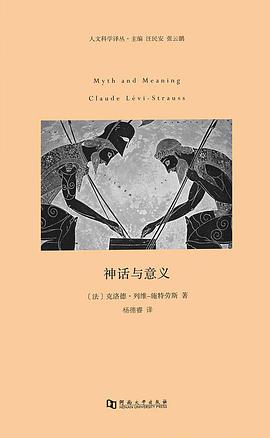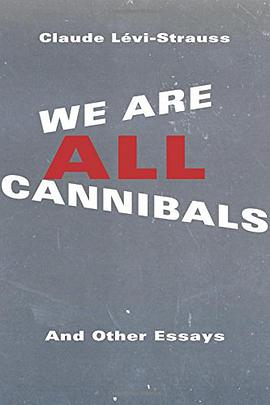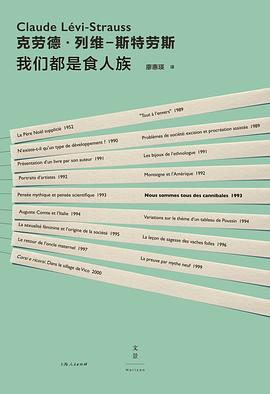列维-斯特劳斯
We Are All Cannibals 豆瓣
作者:
Claude Lévi-Strauss
译者:
Jane Marie Todd
Columbia University Press
2016
- 3
On Christmas Eve 1951, Santa Claus was hanged and then publicly burned outside of the Cathedral of Dijon in France. That same decade, ethnologists began to study the indigenous cultures of central New Guinea, and found men and women affectionately consuming the flesh of the ones they loved. "Everyone calls what is not their own custom barbarism," said Montaigne. In these essays, Claude Lévi-Strauss shows us behavior that is bizarre, shocking, and even revolting to outsiders but consistent with a people's culture and context.
These essays relate meat eating to cannibalism, female circumcision to medically assisted reproduction, and mythic thought to scientific thought. They explore practices of incest and patriarchy, nature worship versus man-made material obsessions, the perceived threat of art in various cultures, and the innovations and limitations of secular thought. Lévi-Strauss measures the short distance between "complex" and "primitive" societies and finds a shared madness in the ways we enact myth, ritual, and custom. Yet he also locates a pure and persistent ethics that connects the center of Western civilization to far-flung societies and forces a reckoning with outmoded ideas of morality and reason.
These essays relate meat eating to cannibalism, female circumcision to medically assisted reproduction, and mythic thought to scientific thought. They explore practices of incest and patriarchy, nature worship versus man-made material obsessions, the perceived threat of art in various cultures, and the innovations and limitations of secular thought. Lévi-Strauss measures the short distance between "complex" and "primitive" societies and finds a shared madness in the ways we enact myth, ritual, and custom. Yet he also locates a pure and persistent ethics that connects the center of Western civilization to far-flung societies and forces a reckoning with outmoded ideas of morality and reason.
我们都是食人族 豆瓣
Nous sommes tous des cannibales
8.1 (66 个评分)
作者:
[法] 克劳德·列维-斯特劳斯
译者:
廖惠瑛
世纪文景/上海人民出版社
2016
- 8
现代最伟大的人类学家 列维-斯特劳斯 写给普通读者的小书
以异域经验观照本地现实,以人类学家之眼理解当代文化
•输血、注射脑垂体提取激素、器官移植,是不是食人行为?
•男性割礼被社会容许,可为何女性割礼侵害人权?
•身为异教、迷信代言人的圣诞老人,当今转而成为了圣诞节的 象征,化身被成人鼓励的儿童梦想。这种转变是如何实现的?
本书为结构主义大师列维-斯特劳斯于1989年至2000年间,在意大利《共和报》所发表的16篇专栏集结,以及发表于1952年的《被处决的圣诞老人》一文。
在这些文章里,列维-斯特劳斯立足当时社会热点,探讨了如圣诞为何“习俗”风靡全球、疯牛病蔓延广泛、女性割礼是否侵害人权、亲子关系应基于血缘还是亲缘等议题,用结构主义和人类学的眼光审视自己身处的时代和社会,反思科学与自然的关系,告诉我们“所谓复杂或先进的社会,与被误称为原始或古代的社会,两者之间的距离远较人们认知的小上许多。”
就像出版于1955年的《忧郁的热带》一样,列维-斯特劳斯文章的写作时间并不标示它过期的时间。相反,他在这些文章中对当代社会的文化反思放到现在依然成立,且无比犀利,几近预言。
以异域经验观照本地现实,以人类学家之眼理解当代文化
•输血、注射脑垂体提取激素、器官移植,是不是食人行为?
•男性割礼被社会容许,可为何女性割礼侵害人权?
•身为异教、迷信代言人的圣诞老人,当今转而成为了圣诞节的 象征,化身被成人鼓励的儿童梦想。这种转变是如何实现的?
本书为结构主义大师列维-斯特劳斯于1989年至2000年间,在意大利《共和报》所发表的16篇专栏集结,以及发表于1952年的《被处决的圣诞老人》一文。
在这些文章里,列维-斯特劳斯立足当时社会热点,探讨了如圣诞为何“习俗”风靡全球、疯牛病蔓延广泛、女性割礼是否侵害人权、亲子关系应基于血缘还是亲缘等议题,用结构主义和人类学的眼光审视自己身处的时代和社会,反思科学与自然的关系,告诉我们“所谓复杂或先进的社会,与被误称为原始或古代的社会,两者之间的距离远较人们认知的小上许多。”
就像出版于1955年的《忧郁的热带》一样,列维-斯特劳斯文章的写作时间并不标示它过期的时间。相反,他在这些文章中对当代社会的文化反思放到现在依然成立,且无比犀利,几近预言。
憂鬱的熱帶 豆瓣
Tristes Tropiques
作者:
李維 • 史特勞斯
/
Claude Lévi-Strauss
译者:
王志明
聯經出版公司
1989
- 5
本書作於1955年,是結構人類學宗師李維.史特勞斯的思想自傳與成名作。青壯時代,他展開行腳,親訪亞馬遜河流域與蓊鬱的巴西高地森林,在叢莽深處找到還原於最基本形貌的人類社會。《憂鬱的熱帶》記述他在卡都衛歐、波洛洛、南比克瓦拉等幾個最原始部落裡情趣盎然、寓意深遠的思考歷程與生活體驗。李維.史特勞斯以全新的取徑、開放的眼光,根據每備銳詳切的洞識觀察,副以生動豐富的想探索,將這些部落放在世界脈絡之中,提出引人入勝的比較印證,境界遠邁他本行的專門領域與科學研究,成為一部對促進人類自我了解且有罕見貢獻的人類學、文學、人類思想傑作。




